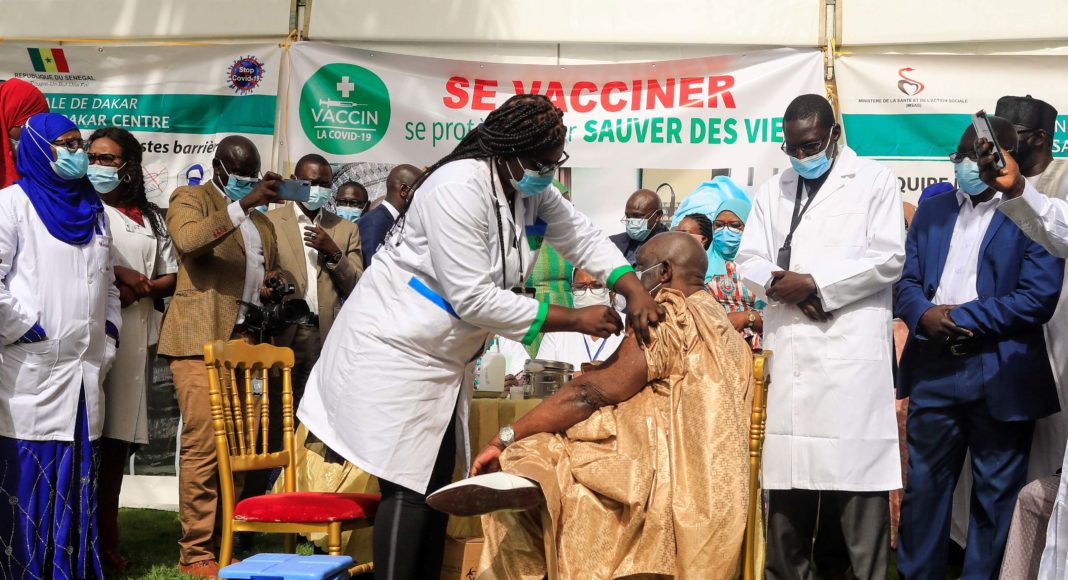By Aïda Dramé
Nearly a year after the start of the pandemic, the development of vaccines in record time is perceived in Senegal as a source of hope for some, and risk for others. While Western countries are rushing to Pfizer and Moderna vaccines, several African countries seem, for the moment, to be turning to the Chinese vaccine Sinopharm. After the Seychelles, Zimbabwe, Egypt, Equatorial Guinea and Morocco, Senegal began its vaccination campaign three weeks ago with 200,000 doses of the vaccine.
Public opinion on the vaccination campaign swings between enthusiasm and skepticism. For some, the campaign is welcomed as the end to the pandemic. “It is the collective that must take precedence over the individual. It’s not just about ‘me’. It’s about my parents who are elderly. I think of their well-being first,” said an Instagram user named Moussa during a live stream. “For this reason alone, I will get vaccinated and urge [everyone] to do so without further delay,” he added.
Bigué Marcelle, project manager at the LEGS Africa research center agrees. “I think we should vaccinate rather than play the lottery with the virus. I agree that it is politicized, but today it is the only effective solution we have,” she said.
Babacar Lo, a student in the sociology department at Cheikh Anta Diop University in Dakar, said he is shocked by the reluctance of some to get vaccinated. “It surprises me that this can be the subject of a debate. When you have a family member who is going to die from Covid-19, you will not hesitate to be injected with these doses,” he said.
Doctors like Mohamed Dieng, a physician at Aristide le Dantec Hospital, have been promoting the vaccine to help the population feel more comfortable. “Serious and conclusive scientific studies have been conducted. As health personnel, we are not interested in competition from laboratories. All we are interested in is preventing this disease and stopping this hecatomb. For the well-being of the greatest number of people, let’s vaccinate,” he said.
Despite these efforts, some conspiracy theories still circulate, speculating among other things that the Covid-19 vaccines were designed to stop the growth of the African population. Some medical experts say the mistrust of some Senegalese is partly fueled by the fact that there was already a familiarity with the drug chloroquine, which has been used as treatment for Covid-19 in Senegal since the beginning of the pandemic. The push by French doctor Didier Raoult fueled an intense demand that put many pharmacies out of stock of the drug for months.
According to Alice Desclaux, a medical anthropologist at the Regional Center for Research and Training at Fann Hospital in Dakar, the trust in chloroquine can be explained by the fact that it has been used by many Africans during childhood, and that it’s perceived as belonging to the “category of African phytoremedies”. “It is often mistakenly considered to be derived from quinine, and similar to other plant remedies described today as traditional African malaria treatments (Azadirachta indica, Artemisia),” she explained in her study “Covid-19: In West Africa, the vaccine is not the new magic bullet.”
In addition, “many media outlets presented it as a scientifically validated drug in Africa. The doctors or pharmacists who expressed caution about its promotion as a Covid treatment, who were very much in the minority, did not create a public controversy,” she added
Even though a study led by Raoult himself concluded that the use of chloroquine did not ultimately change “oxygen requirements, transfer to ICU and death” in treated patients, in the popular imagination in Senegal, chloroquine was the ideal remedy. This contrasts with the new coronavirus that have lead some to feel like “guinea pigs”.
Others are more concerned with the government’s lack of communication than the vaccine itself. “Why would I want to be vaccinated when I don’t even know the ins and outs? Our president should have at least communicated effectively about this, but he didn’t. I’m not going to take the plunge into the unknown,” said a cleaning lady named Awa.
Her assessment of the government’s campaign is shared by Dr. Elhadj Mbaye, a consultant to the World Health Organization, who believes that “the problem is not the vaccine but the communication around it. People need to be listened to and have their questions answered, and this has not been done enough,” he said.
That said, Souleymane, a fifth-year student in the pharmacy department at Saint Christopher’s School, believes that “in the end, despite all this controversy, we will all be vaccinated sooner or later. “

